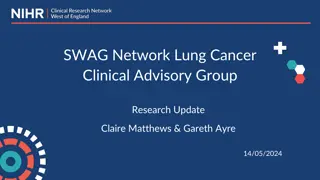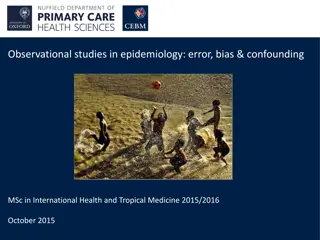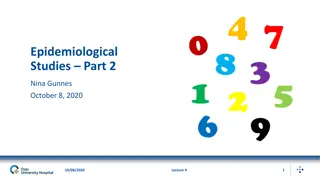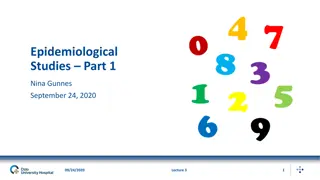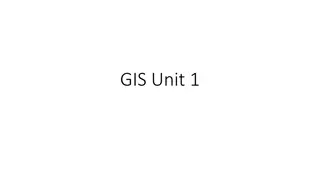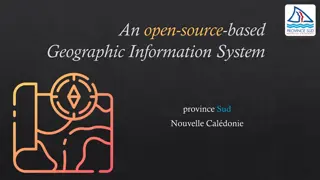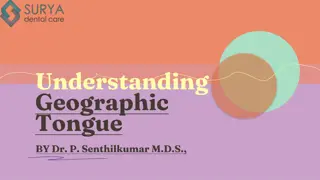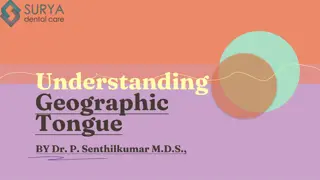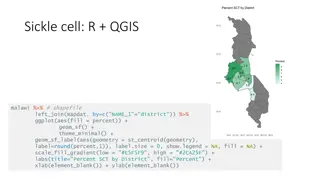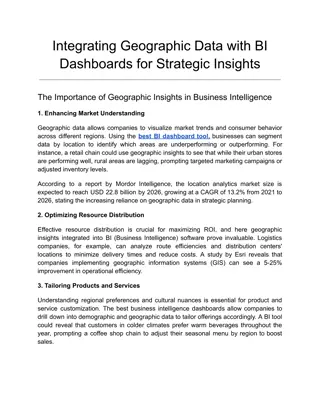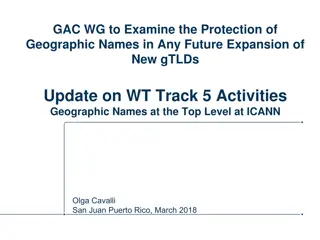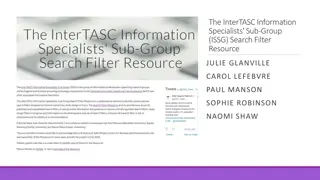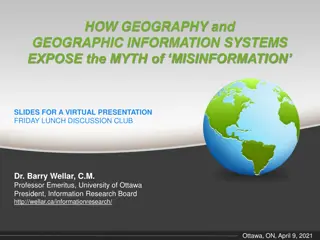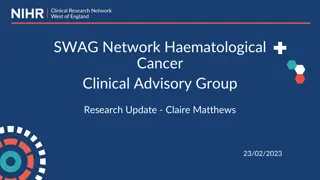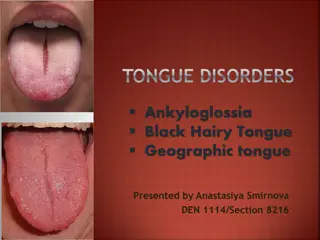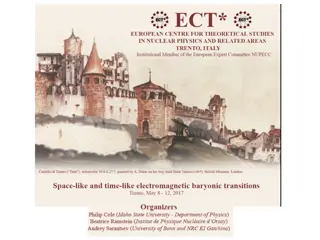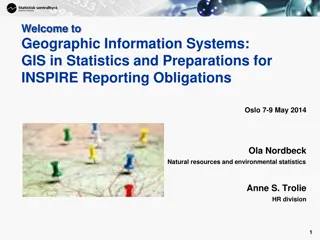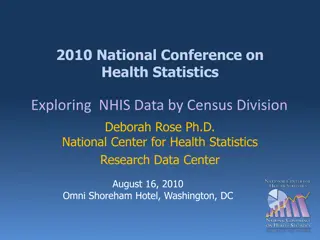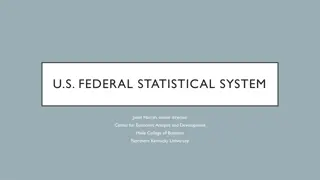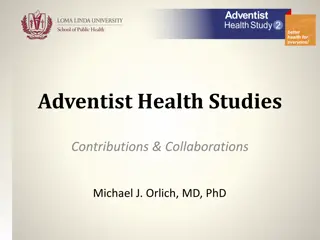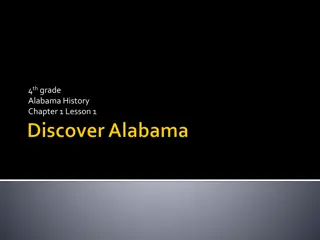Social Studies
The diverse range of Social Studies courses offered at Shaftesbury High School, including Grade 9 Canada in the Contemporary World, Grade 10 Geographic Issues of the 21st Century, American History, Grade 11 Canadian History, Cinema as a Witness to Modern History, and Current Topics in First Nations,
3 views • 11 slides
Remarkable Opportunities in Higher studies after Civil Engineering
Higher studies after Civil Engineering in Tamil Nadu\nCivil engineering stands at the forefront of shaping our physical environment; from the infrastructure we rely on daily to the sustainable development of our cities. Further, pursuing Higher studies after Civil Engineering opens up countless oppo
0 views • 2 slides
Latest Research and Studies on Lung Cancer - Update May 2024
This research update includes information on national recruitment to lung cancer studies, comparison of national vs. regional recruitment, and detailed descriptions of various studies and trials related to lung cancer. The studies cover areas such as treatment advancements, observational studies, ma
2 views • 13 slides
Understanding Observational Studies in Epidemiology
Delve into the realm of observational studies in epidemiology, exploring concepts such as error, bias, and confounding. Discover the significance of various study designs, from case reports to prospective cohort studies, in elucidating associations and establishing causality in non-communicable dise
2 views • 58 slides
Overview of Cohort Studies in Epidemiology
Cohort studies are a type of observational study where a group of healthy subjects is followed over time to investigate relationships between exposures and outcomes. They provide valuable insights into disease development and risk factors, offering advantages like assessing multiple exposures and en
0 views • 21 slides
Overview of Ecological Studies in Epidemiology
Ecological studies in epidemiology involve studying groups of individuals at a population level to examine the correlation between exposure and disease occurrence. While cost-effective and useful for generating hypotheses, ecological studies have limitations, such as the inability to control for con
3 views • 21 slides
Evolution of Data Processing Systems in Geographic Information Science
Data processing systems in Geographic Information Science have evolved from manual, analogue methods to advanced software and hardware components. The incorporation of Geographic Information Systems (GIS) has revolutionized the handling and analysis of geo-referenced data, making tasks like data cap
0 views • 20 slides
Understanding Geographic Objects in GIS
Geographic objects play a crucial role in GIS by being easily distinguished and named based on parameters like location, shape, size, and orientation. These objects are studied collectively to understand their interactions and relationships, aiding in tasks such as navigation systems and route optim
4 views • 13 slides
Geographic Information System in Sud Nouvelle Calédonie
The province of Sud Nouvelle Calédonie utilizes an open-source-based Geographic Information System (GIS) to serve its territorial administration, with a focus on applications such as land administration, environment, agriculture, and urban planning. The system is supported by a team of engineers, g
0 views • 15 slides
Exploring 2nd Grade National Geographic: Weather, Tools, and Natural Disasters
Dive into the fascinating world of weather phenomena with 2nd-grade National Geographic resources. From predicting weather using clouds to learning about thunderstorms, hurricanes, and tornadoes, this educational journey also covers weather tools and being prepared for natural disasters.
0 views • 15 slides
Overview of Media Studies Disciplines and Historical Development
Media studies is a multidisciplinary field that explores the content, history, and effects of various media, with roots in the relationship between media and culture. Originating in the 1920s, media studies draws on traditions from social sciences and humanities, incorporating theories from discipli
5 views • 18 slides
what is Geographic Tongue and how does it look
Geographical tongue is an non-contagious condition that provides an atypical, map-like structure to the tongue. A detailed note on this problem is given here. For More Info Visit: \/\/ \/what-is-geographic-tongue\/
0 views • 11 slides
what is Geographic Tongue and how does it look
Geographical tongue is an non-contagious condition that provides an atypical, map-like structure to the tongue. A detailed note on this problem is given here. For More Info Visit: \/\/ \/what-is-geographic-tongue\/
0 views • 11 slides
Geographic Data Visualization in R and QGIS for Malawi Health Analysis
Utilizing R and QGIS, this project focuses on visualizing sickle cell and HIV percentages by district in Malawi, mapping health facility locations, creating Voronoi polygons, and displaying malaria cumulative incidence data. Various geographic data visualization techniques are applied to provide ins
0 views • 8 slides
Understanding Clinical Trials: Types and Designs
Clinical trials are essential research studies that evaluate new tests and treatments to improve human health outcomes. They involve various phases, designs, and purposes, such as treatment trials, prevention trials, and observational studies. Different types of clinical trial designs include experi
7 views • 18 slides
Integrating Geographic Data with BI Dashboards for Strategic Insights
Explore the transformative potential of integrating geographic data into BI dashboard tool for strategic insights in our latest blog. Dive deep into the process\u2014from defining precise objectives and meticulous data collection to expert dashboard
0 views • 13 slides
Understanding Geographic Distribution Using 3-Digit ZIP Codes
Massachusetts has approximately 685 5-digit ZIP codes assigned by the USPS, which can be aggregated into 18 3-digit ZIP codes for geographic analysis. The distribution of Emergency Department visit volumes varies across these 3-digit ZIP code boundaries, reflecting different regional characteristics
1 views • 4 slides
GAC Working Group on Geographic Names Protection in New gTLD Expansion
The GAC Working Group is focused on improving protections for geographic names in future gTLD expansions. They aim to develop practical options and rules to reduce uncertainties for governments, communities, and applicants using geographic or community names. The group seeks to engage local communit
2 views • 27 slides
Enhancing Search Filters for Evidence Synthesis: The ISSG Search Filter Resource
Introduction: The ISSG Search Filter Resource provides methodological search filters for identifying studies of specific designs, aiding in evidence synthesis and guideline development. The site is produced through monthly searches in databases like CINAHL, Embase, and MEDLINE. It offers filters for
1 views • 8 slides
Exposing the Myth of Misinformation Through Geography and GIS
Geography and Geographic Information Systems play a crucial role in debunking the myths of misinformation. Dr. Barry Wellar discusses the impact of misinformation, highlighting the importance of geographic data in transforming information and knowledge. The presentation delves into the reasons behin
0 views • 17 slides
Mrs. Carter's Social Studies Class Agenda - February 24-28, 2020
Explore Canada's assessment standards and Australia's geographic features in Mrs. Carter's social studies class agenda for the week of February 24-28, 2020. Topics include NAFTA, Australia's landmarks, climate study, and more. Engage in activities, tests, and projects related to global geography and
0 views • 9 slides
Hematological Cancer Clinical Studies Update and Recruitment Statistics
Latest update on hematological cancer clinical studies from the SWAG.Network Haematological Cancer Clinical Advisory Group, including national recruitment data, regional recruitment comparisons, open studies, and sample size information for ongoing studies. This comprehensive update covers a range o
0 views • 14 slides
Understanding Tongue Disorders: Ankyloglossia, Black Hairy Tongue, Geographic Tongue
Ankyloglossia, also known as tongue-tied, is a congenital anomaly affecting tongue mobility. Black hairy tongue is the lengthening of papillae on the tongue surface, often temporary and resolve without treatment. Geographic tongue presents as white patches and is usually asymptomatic. Treatment opti
0 views • 10 slides
Advances in Baryon Spectroscopy and Hadronic Matter Studies
Discussions at the meeting focused on interpreting HADES results for e+e- and meson production in hadronic reactions, with studies involving proton, pion, light, and heavy ion beams. The role of time-like electromagnetic transitions, baryon spectroscopy, and connecting hadronic matter studies were e
0 views • 12 slides
Geographic Information Systems: GIS in Statistics and INSPIRE Reporting Obligations
This document outlines the agenda and practical details for a GIS workshop focusing on statistical production and data processing related to geographic information systems. It includes sessions on population gridded data production, automation processes, and practical exercises. Participants from va
1 views • 5 slides
Geographic Data Analysis in Health Statistics Conference
The 2010 National Conference on Health Statistics explored the use of restricted data at the National Center for Health Statistics Research Data Center. The presentation delved into the types of data requested, including small geographic areas, sensitive information, mortality files, and genetic dat
0 views • 45 slides
Overview of the U.S. Federal Statistical System and Census Geography
The U.S. Federal Statistical System comprises 13 principal statistical agencies responsible for collecting and analyzing data across various sectors. The system includes agencies like the Bureau of Economic Analysis, Bureau of Labor Statistics, and U.S. Census Bureau. Geographic identifiers (GEOIDs
0 views • 94 slides
Geographic Concepts Explained with Visuals
Explore various geographic concepts such as time zones, latitude, albedo, environmental spheres, and interactions between spheres through informative images and descriptions. Topics include longitude measurements, Tropic of Cancer location, hemispheres identification, time zone differences, environm
0 views • 34 slides
Understanding Targeted Clinical Investigation in Pharmacovigilance
Targeted clinical investigation plays a crucial role in pharmacovigilance by further evaluating significant risks identified in pre-approval clinical trials. This involves conducting pharmacokinetic and pharmacodynamic studies, genetic testing, interaction studies, and large simplified trials to ass
0 views • 12 slides
Meeting the Challenge of Diabetes in China: Prevalence, Trends, and Geographic Variances
This comprehensive study examines the prevalence, trends, and geographic variances of diabetes in China compared to the United States. With a focus on diabetes and prediabetes rates, the analysis spans over two decades, highlighting the significant burden of the disease in the Chinese population. Th
0 views • 24 slides
Concentration and Minor Requirements for Bachelor of General Studies (BGS)
Bachelor of General Studies (BGS) students at Northwestern State University of Louisiana must complete a concentration consisting of 36 hours, with a minimum of 12 hours at the 3000 and 4000 levels taken at NSU. The popular concentrations are Social Science, Computer & Natural Science, and Arts & Co
0 views • 9 slides
Understanding Geographic Coordinates: Importance and Significance
Explore the significance of geographic coordinates in oceanography and ecosystems. Learn why wind plays a crucial role in various oceanographic disciplines. Discover how latitude and longitude are utilized to pinpoint locations on Earth's surface, whether using degrees, minutes, seconds or decimal d
0 views • 31 slides
Exploring Pesticide Monitoring and Contamination Studies in Maine
Mary Tomlinson's work with the Maine Board of Pesticides Control includes past studies on groundwater and surface water monitoring, ongoing monitoring initiatives, and future collaborative studies. The State Law mandates residue surveys to identify possible contamination sources and develop a pestic
1 views • 55 slides
Adventist Health Studies Contributions & Collaborations Overview
Adventist Health Studies have made significant contributions to understanding the health and longevity advantages of Seventh-day Adventists, particularly focusing on vegetarian diets and cardiovascular health. With a history spanning over 57 years and various cohort studies, these studies have provi
0 views • 12 slides
Exploring Geographic Features: From Oceans to Volcanoes
Discover the diverse range of geographic features, from vast oceans and intricate coral reefs to winding rivers and dense forests. Learn about intriguing formations like peninsulas, isthmuses, and straits, and delve into natural wonders like sinkholes and wetlands. From coastal regions to volcanic l
0 views • 29 slides
Building a Food Studies Center at Met College
Establishing a Food Studies Center at Met College, driven by the merging of Food and Wine courses with Gastronomy programs, aims to integrate hands-on and academic approaches to food studies. Drawing inspiration from existing models like the Culinaria Research Centre and the Center for Regional Agri
2 views • 8 slides
Submarine Cable Resiliency Report Update - September 2016
This update presents the final findings of Working Group 4A on Submarine Cable Resiliency, focusing on the importance of coordinating federal, state, and local agencies to mitigate risks to submarine cable infrastructure. The report highlights the critical role of regulatory coordination and geograp
0 views • 11 slides
Submarine Cable Resiliency Update and Recommendations
Working Group 4A provides updates on the status of submarine cable resiliency, highlighting the risks to infrastructure due to lack of coordination across agencies and clustering of cable routes. The group aims to enhance regulatory coordination and promote geographic diversity to ensure network res
0 views • 7 slides
Discovering Alabama's Geography: A 4th Grade History Lesson
Explore the geographic regions of Alabama and learn about its history, economy, and political landscape in this 4th-grade history lesson. Students will identify the state's border states, major geographic provinces, and natural resources through thematic maps and interactive activities.
0 views • 19 slides
Geographic Support System Initiative (GSS-I) Overview
The Geographic Support System Initiative (GSS-I) aims to enhance address data quality through partnerships with tribal, state, county, and local governments. This program involves acquiring, verifying, and geocoding address data, with a focus on improving address coverage and spatial accuracy. Reeng
0 views • 20 slides


